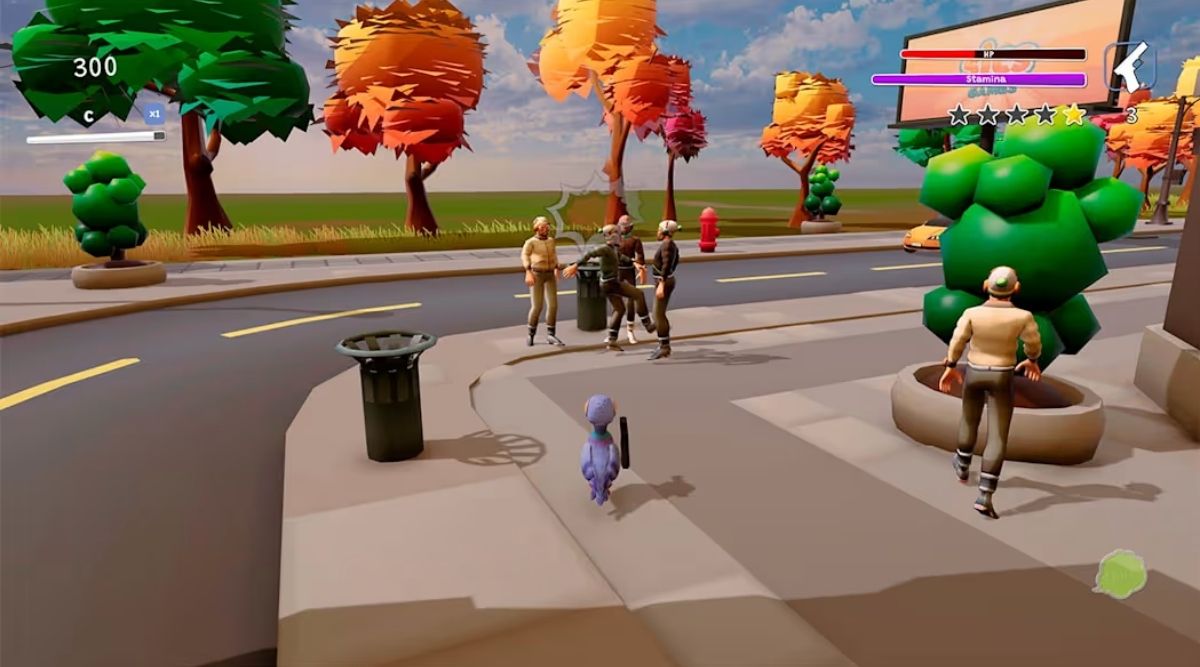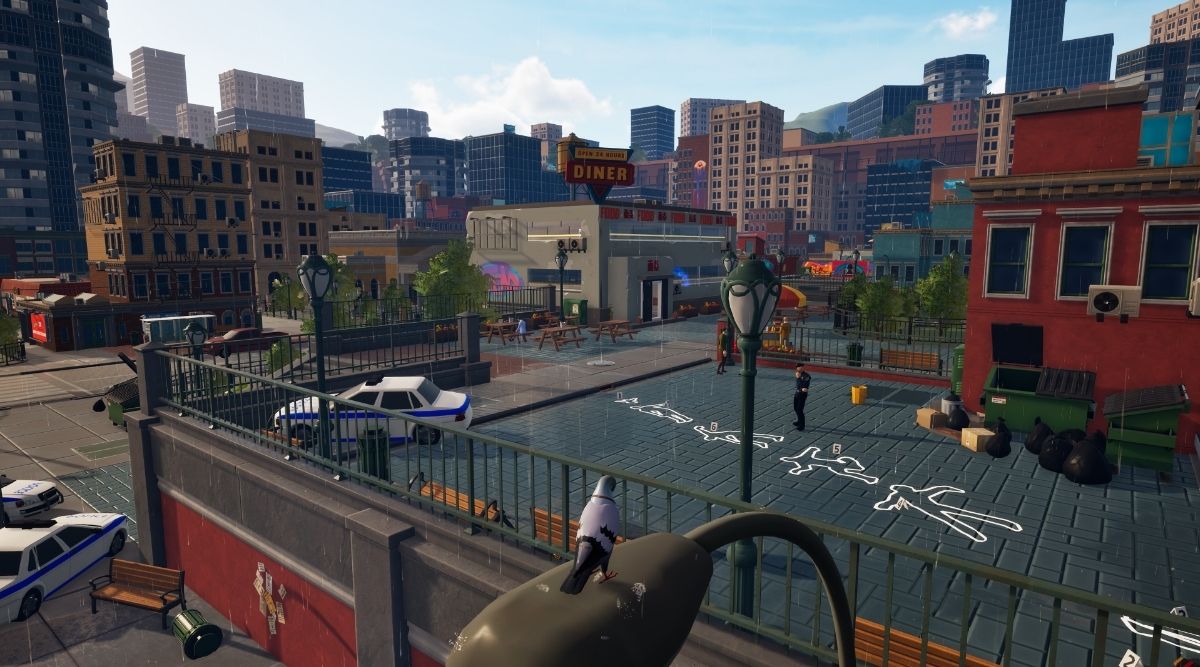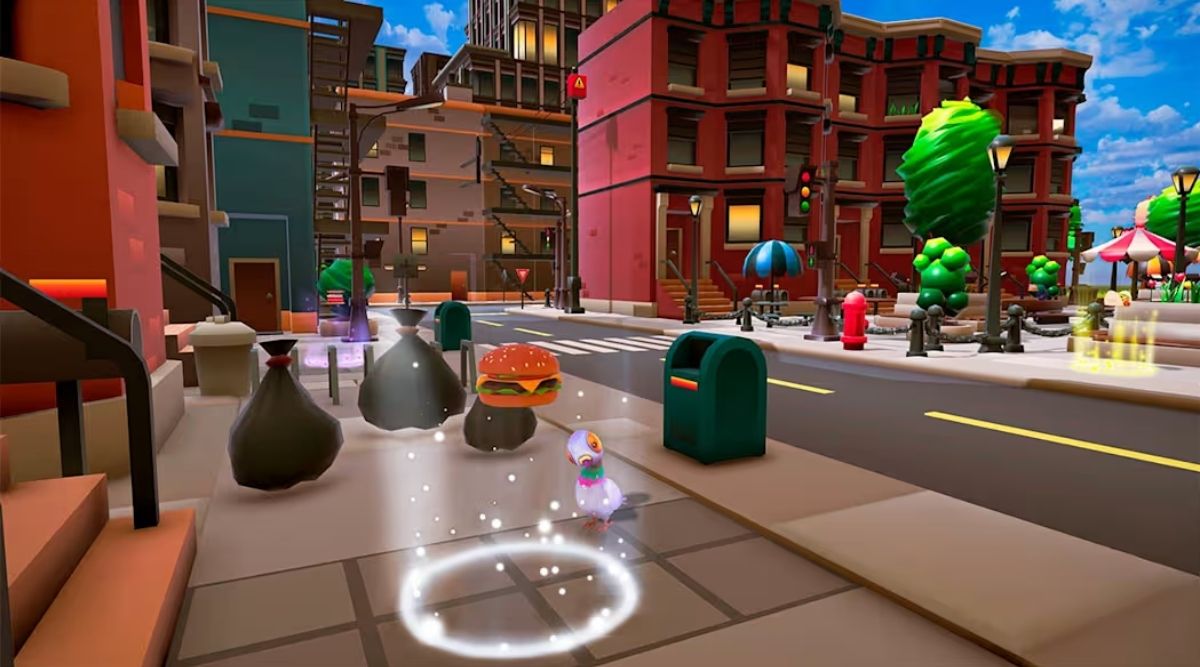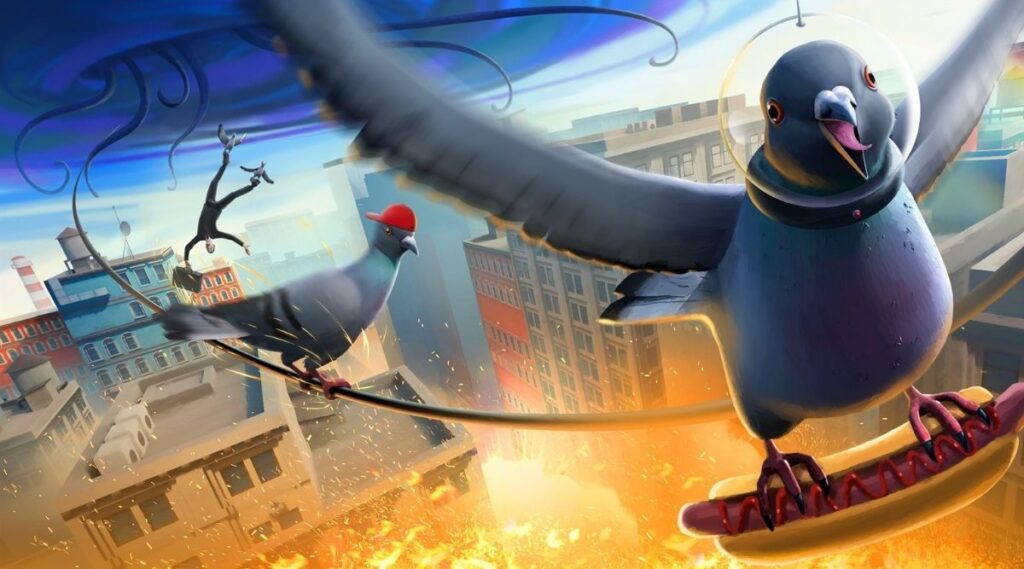If you’ve ever wondered what it’s like to be a secret pigeon agent tossed into a whirlwind of pure chaos, Pigeon Simulator delivers that absurd fantasy in spades. TinyBuild’s latest may look like just another goofy physics sandbox, but once you dive in, you realize this bird’s got some serious power in its beak.
Beneath the feathers and obvious slapstick, the world itself has a surprising amount of structure. Each level is a slice of a city or town overrun by anomalies: glowing, dangerous, unpredictable entities that feel like something ripped out of a cosmic horror comedy.
Humans scream, cars behave unpredictably, and the environment constantly shifts into a playground for chaos. The deeper you go, the darker and stranger the world becomes, especially when you dip into the upside-down spaces where anomalies spawn. The enemies are varied enough in their attacks that players will be on their never be standing still.
The pigeon build system is where the game really shows its teeth.

Every run is built around collecting resources, neutralizing anomalies, and making it to extraction in one piece. That extraction loop is where the game pulls heavily from extraction shooters: get in, do enough to justify your existence, and get out before the chaos scale turns the world into an unwinnable mess. The longer you stay, the more unpredictable everything becomes, and the more likely physics starts betraying you in hilarious, awful ways.
The pigeon build system is where the game really shows its teeth. Each upgrade matters. You can enhance your mobility, your attack speed, your pooping power (yes, obviously), your ability to tank hits, and even your control over environmental objects. Going down the weapon-focused skill line until you unlock the shotgun-like blast is a genuine turning point. You go from a fragile little bird to a mobile artillery unit, capable of clearing out threats before they reach you.
But every build comes with trade-offs. You might turn into a powerhouse with high damage, but you’ll feel slower and more vulnerable early on. Or you might build around mobility, zipping around the map while using the environment to your advantage. And with goofy gear, hats, cans, suitcases, radios, you can tweak your strengths in ways that feel improvised and chaotic, but still strategic. It’s very much that “try again, learn more, survive longer” rhythm you’d expect from any extraction shooter or Souls-like experiment. And when it works, it works beautifully.
The Xbox and PC versions of Pigeon Simulator are dramatically different.

Depending on where you play it, though, you’re basically playing two different games. On PC, everything feels a lot more accessible. The controls are smoother, you’ve got better accessibility options, and even colorblind modes that make the chaos a lot more readable. The core mechanics are identical on both platforms, but the difference in controls and readability creates two very different experiences, especially in the early game. Same systems, very different feel.
On Xbox with a controller, however, you’re in for a trial by fire. The early hours can feel like you’ve stumbled into a feathered version of Dark Souls, with every dive and swoop demanding way more precision. The tutorial cracks a few jokes but doesn’t really prepare you for how intense things get, and on console, that gap is pretty obvious. You end up spending your early upgrades just trying to make the game feel as manageable as it does by default on PC.
Even though both versions come from the same Xbox build, the PC version has more accessibility options than the console version. On PC, features like colorblind modes and clearer visual settings make it much easier to read the chaos, especially in the darker anomaly zones in the Upsidedown.
On Xbox, those options just aren’t there. You mostly get sensitivity adjustments, which means Pigeon Simulator is harder to read and harder to learn, especially when the action ramps up. It creates an unexpected gap: PC feels tuned and approachable, while the console feels tougher simply because you have fewer tools to work with. And that’s a problem, because the game expects you to read the world clearly; every threat, every sound, every glow matters.
Dealing with the chaos is really the main goal of each run.

But once it clicks, especially if you bring friends along, that’s where it shines. The shared wallet forces teams to diversify builds. One pigeon can go tank, another goes mobility, another becomes the team’s artillery bird, and suddenly you’re operating like a feathered strike squad.
Or just grab whatever feels right, and figure it out. It’s chaotic, but also surprisingly coordinated once everyone settles in. Not having couch co-op on Xbox is a missed opportunity, though. This is a game that practically begs for shouting, pointing, panicking, and laughing in the same room. Without that, the console version loses some of its most obvious social charm.
The goal of each run isn’t just “deal with the chaos,” even though that’s half the fun. It’s to restore balance in a city that’s spiraling into madness. You deal with anomalies, stop reality distortions, and earn money to strengthen your pigeon for the next run. Everything circles back to that extraction loop: get in, survive the increasingly absurd nonsense, and get out before the world collapses around you.
Once it all clicks, Pigeon Simulator becomes a hilarious, chaotic ride.
In the end, Pigeon Simulator is tough and fun in equal measure. The chaos is thrilling when it’s on your side and frustrating when physics decides to betray you. On PC, it’s a smoother ride and easier to recommend to everyone. On Xbox, it’s more of a challenge best suited for players who like extra difficulty and don’t mind a stiff learning curve.
But once it all clicks: once the build system comes together, once you learn the cues, once your squad finds its rhythm, Pigeon Simulator becomes a hilarious, chaotic ride that keeps you coming back for more; hopefully with friends.
Pigeon Simulator is out now on Xbox Series X|S and available with Game Pass.
Pigeon Simulator
-
Rating - 7.5/107.5/10
TL;DR
Once your squad finds its rhythm, Pigeon Simulator becomes a hilarious, chaotic ride that keeps you coming back for more; hopefully with friends.







